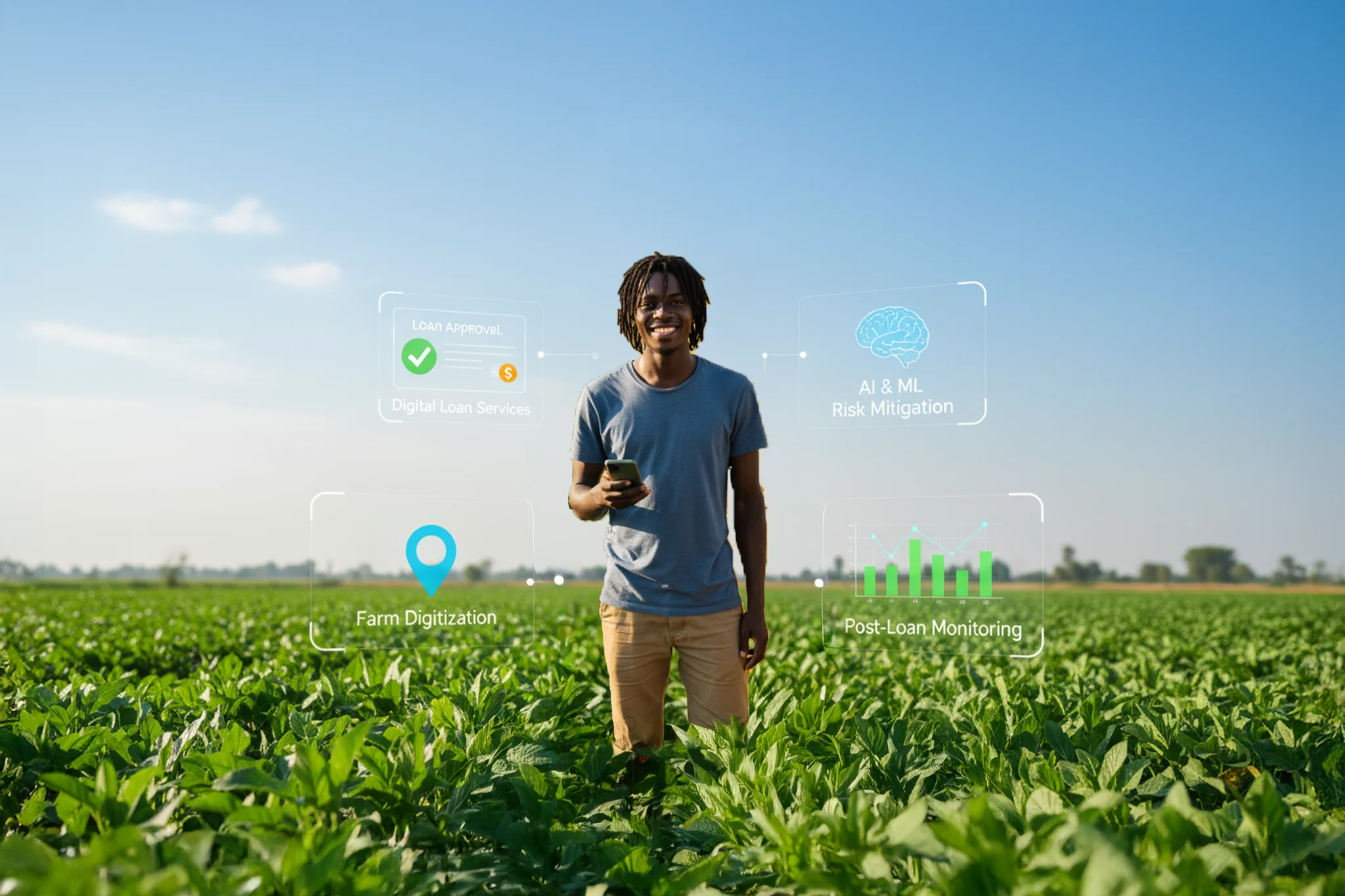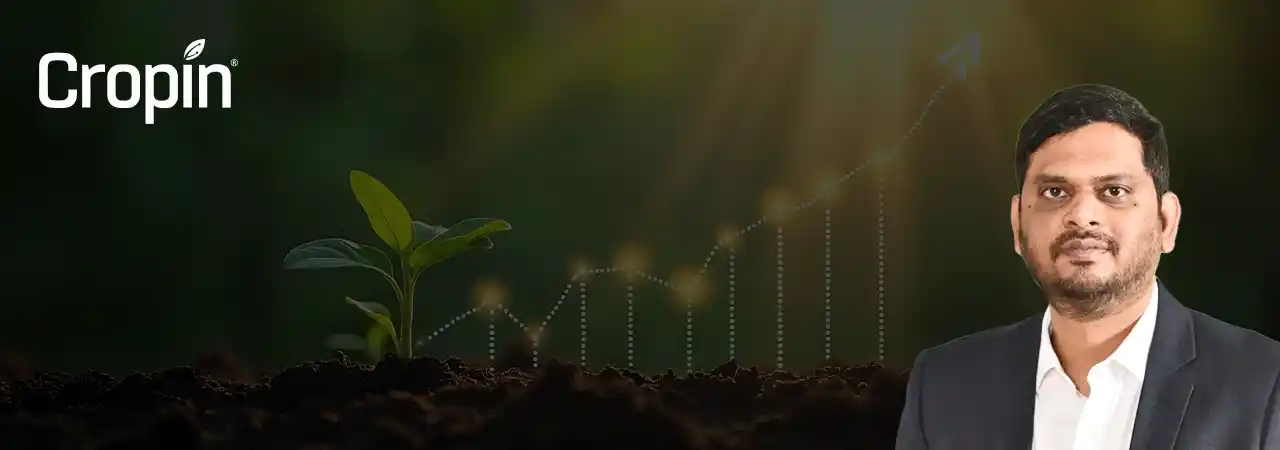The World Economic Forum estimates that about 600 million smallholder farmers worldwide contribute to approximately 28%-31% of total crop production and 30%-34% of the food supply. Though the world relies on smallholder farmers to feed its growing population, the responsibility and risk these farmers shoulder daily is not matched by the technological and financial support they receive to sustain themselves. Marginal farmers need help accessing financial services that can enable them to invest in critical seasonal inputs. The percentage of marginal farmers with access to finance is difficult to quantify, and according to several estimates it varies from 7% to 10%.
Smallholder farming mostly depends on the weather and limited infrastructure. Local variables such as water sources and geo-specific nuances, along with climate and environmental risks, add to the complexity. Climate change and the accompanying extreme weather patterns have exacerbated the challenges. Access to finance would help farmers protect themselves and develop resilience. It is essential to provide smallholder farmers with the ability to invest in tools to increase farm productivity, optimize the supply chain, manage risks, and adopt practices that are associated with climate-smart agriculture to ultimately ensure food security.
Challenges in facilitating financial support for smallholder farmers
Access to farm financing from formal financial institutions can be challenging for many smallholder farmers. This is attributed to a lack of records of land and personal data, low financial awareness and knowledge about the banking system, absence of digital footprint, under-utilization of technology, scarcity of assets that can be pledged as collateral, and so on. These factors make them unattractive clients for risk management products and service providers. They often get trapped in loans from loan sharks who charge high interest rates that destroy their lives.
Financial institutions too face challenges in providing services to smallholder farmers. These include lack of access to farmers located in remote rural areas; unique and unpredictable risks of agriculture; lack of knowledge about farmers’ creditworthiness; high operating costs; lack of agronomic expertise, etc.
Credit cooperative societies and development agencies play a critical role in the financial lives of smallholder farmers. They enable agricultural development funds to reach farmers who require them. However, farm credit services is not always given where and when due and to the people who need it the most. The fund disbursal process has flaws that can hamper the distribution of agri-loan schemes. The complex loan disbursement process sometimes creates delays that lead to losses for farmers. Imbalances in credit, exploitation of interest subvention and loan waiver schemes, misuse of funds, increase in indirect loans, etc., erode the effectiveness of many agricultural schemes and programs that government organizations and funding institutions provide for the agricultural sector.
Cropin cloud’s ai-powered risk mitigation solutions for agricultural loans
Digitizing agricultural loan services not only helps financial service providers reduce transaction costs, but it also gives them access to reliable information to improve product targeting to serve smallholder farmers.
Comprehensive management of financial services on a single platform not only helps streamline crop insurance, loans, payments, and collections, but also improves accuracy and transparency of financial transactions. Accessing agri-credit becomes easy for farmers while minimizing risk for financial institutions. The artificial intelligence (AI)- and machine learning (ML)-powered platforms on Cropin Cloud not only help lending institutions monitor and track farm plots remotely but also to assess performance and agri-input risk analysis.
Cropin Cloud helps to gather real-time, accurate information from farmers and geotag farms, digitize farm and farmer records, and provide crop analysis. This not only reduces the time and cost of data aggregation for credit rating but also ensures easy access to information on a secure cloud platform and decreases delays. Data from multiple sources, such as satellite imagery, sensors, drones, Internet of Things (IoT) devices, and weather reports are collected and analyzed to derive insights that help improve efficiency.
Cropin Grow and Cropin Connect help monitor and manage fund usage and crop health post-loan disbursal and ensure seamless communication between farmers and agri-lending institutions. Cropin’s advisory services address low usage of technology, improper training, and poor engagement levels of farmers. Predictive modeling for yield, weather, diseases, pests, water stress and harvest date estimation; package of practices; real-time acreage insights; crop analysis and timely alerts minimize crop losses and increase profits for farmers.
Crop financing is a complex process with its own set of unique challenges. However, Cropin Cloud makes the process easier and smoother by tracking the loan process from origination to recovery, which helps reduce non-performing assets and fraudulent claims.
Learn how cropin solutions helped in ‘unleashing the technological power of digital financial lending and analysis for credit cooperatives in kenya.’
Login phase
The loan application process starts with the farmer visiting the bank branch or the field officer of the concerned bank meeting the farmer in the village. The farmer then submits the following:
- Duly filled application form
- Land documents
- Farmer credentials
- Recommendation report
These are verified by the Loan Origination System (LOS), wherein farmer credentials are verified, and a bureau check and policy check are completed. With this the Login phase is completed.
Credit phase
The next is the Credit phase, during which verification is done by examining the following land documents:
- Land record
- Mutations
- Title search report
Subsequent tasks in the Credit phase are analysis of cropping patterns, crop health review, and crop insurance check.
Legal phase
Customer Profile Validation or Contact Point Verification (CPV) report is generated, which forms the basis for loan sanction. Based on the Market Evaluation Report and District Level Technical Committee (DLTC) recommendations, the farmer is sanctioned the loan. Then, once the legal and mortgage checks are completed, the loan is approved.
In the final step the loan agreement is signed, and the loan is disbursed by the branch.
Ready to unlock the future of agriculture?
Explore Cropin Sage and witness the power of real-time agri-intelligence.










